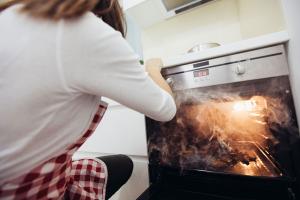Winter storm weather preparation
Before the weather outside becomes frightful, use this checklist to prepare for a winter storm.
Food and water
- Water — at least a three-day supply; one gallon per person, per day
- Food — at least a three-day supply of non-perishable, high-energy, easy-to-prepare foods
- Baby formula and food
- Pet food
TIP #1
Set your refrigerator and freezer to the coldest settings in case the power goes out.
Heating and lighting
- Extra blankets
- Generator and gas to run for 24+ hours
- Candles
- Flashlights and extra batteries
- Alternate supplies for heating methods, such as fireplaces or wood- or coal-burning stoves
- Fire extinguisher
TIP #2
Never use a generator inside. Place it outside where exhaust fumes can't enter through windows, doors or cracks.
Electronics
- Fully charged cell phones, tablets, etc.
- Battery-powered or hand-crank radio
- Extra batteries
TIP #3
Tempted to play games on your phone during the storm? Save the charge in case there's an emergency.
Shovels and tools
- Shovels and tools for clearing snow and ice
- Sand, rock salt or non-clumping kitty litter to make walkways and steps less slippery
- Snow blower gassed (start it to ensure it's ready)
TIP #4
A roof rake can help prevent structural and water damage to your home.
Medical and personal hygiene
- Medications — have at least a seven-day supply
- Medical items — hearing aids with extra batteries, glasses, contact lenses, syringes, etc.
- Sanitation and personal hygiene items
- Baby diapers and wipes
- First aid kit
TIP #5
If you are low on medications, visit your pharmacy to ensure you have enough for one week.
Important information
- Family and emergency contact information
- Copies of personal documents
- Extra cash — in case there is no power (no ATM)
TIP #6
Have the phone numbers of your independent insurance agent and insurance company should you need to file a claim.
Related resources
Winter storm weather preparation
Before the weather outside becomes frightful, use this checklist to prepare for a winter storm.
Food and water
- Water — at least a three-day supply; one gallon per person, per day
- Food — at least a three-day supply of non-perishable, high-energy, easy-to-prepare foods
- Baby formula and food
- Pet food
TIP #1
Set your refrigerator and freezer to the coldest settings in case the power goes out.
Heating and lighting
- Extra blankets
- Generator and gas to run for 24+ hours
- Candles
- Flashlights and extra batteries
- Alternate supplies for heating methods, such as fireplaces or wood- or coal-burning stoves
- Fire extinguisher
TIP #2
Never use a generator inside. Place it outside where exhaust fumes can't enter through windows, doors or cracks.
Electronics
- Fully charged cell phones, tablets, etc.
- Battery-powered or hand-crank radio
- Extra batteries
TIP #3
Tempted to play games on your phone during the storm? Save the charge in case there's an emergency.
Shovels and tools
- Shovels and tools for clearing snow and ice
- Sand, rock salt or non-clumping kitty litter to make walkways and steps less slippery
- Snow blower gassed (start it to ensure it's ready)
TIP #4
A roof rake can help prevent structural and water damage to your home.
Medical and personal hygiene
- Medications — have at least a seven-day supply
- Medical items — hearing aids with extra batteries, glasses, contact lenses, syringes, etc.
- Sanitation and personal hygiene items
- Baby diapers and wipes
- First aid kit
TIP #5
If you are low on medications, visit your pharmacy to ensure you have enough for one week.
Important information
- Family and emergency contact information
- Copies of personal documents
- Extra cash — in case there is no power (no ATM)
TIP #6
Have the phone numbers of your independent insurance agent and insurance company should you need to file a claim.
Related resources
Winter storm weather preparation
Before the weather outside becomes frightful, use this checklist to prepare for a winter storm.
Food and water
- Water — at least a three-day supply; one gallon per person, per day
- Food — at least a three-day supply of non-perishable, high-energy, easy-to-prepare foods
- Baby formula and food
- Pet food
TIP #1
Set your refrigerator and freezer to the coldest settings in case the power goes out.
Heating and lighting
- Extra blankets
- Generator and gas to run for 24+ hours
- Candles
- Flashlights and extra batteries
- Alternate supplies for heating methods, such as fireplaces or wood- or coal-burning stoves
- Fire extinguisher
TIP #2
Never use a generator inside. Place it outside where exhaust fumes can't enter through windows, doors or cracks.
Electronics
- Fully charged cell phones, tablets, etc.
- Battery-powered or hand-crank radio
- Extra batteries
TIP #3
Tempted to play games on your phone during the storm? Save the charge in case there's an emergency.
Shovels and tools
- Shovels and tools for clearing snow and ice
- Sand, rock salt or non-clumping kitty litter to make walkways and steps less slippery
- Snow blower gassed (start it to ensure it's ready)
TIP #4
A roof rake can help prevent structural and water damage to your home.
Medical and personal hygiene
- Medications — have at least a seven-day supply
- Medical items — hearing aids with extra batteries, glasses, contact lenses, syringes, etc.
- Sanitation and personal hygiene items
- Baby diapers and wipes
- First aid kit
TIP #5
If you are low on medications, visit your pharmacy to ensure you have enough for one week.
Important information
- Family and emergency contact information
- Copies of personal documents
- Extra cash — in case there is no power (no ATM)
TIP #6
Have the phone numbers of your independent insurance agent and insurance company should you need to file a claim.
Related resources
Winter storm weather preparation
Before the weather outside becomes frightful, use this checklist to prepare for a winter storm.
Food and water
- Water — at least a three-day supply; one gallon per person, per day
- Food — at least a three-day supply of non-perishable, high-energy, easy-to-prepare foods
- Baby formula and food
- Pet food
TIP #1
Set your refrigerator and freezer to the coldest settings in case the power goes out.
Heating and lighting
- Extra blankets
- Generator and gas to run for 24+ hours
- Candles
- Flashlights and extra batteries
- Alternate supplies for heating methods, such as fireplaces or wood- or coal-burning stoves
- Fire extinguisher
TIP #2
Never use a generator inside. Place it outside where exhaust fumes can't enter through windows, doors or cracks.
Electronics
- Fully charged cell phones, tablets, etc.
- Battery-powered or hand-crank radio
- Extra batteries
TIP #3
Tempted to play games on your phone during the storm? Save the charge in case there's an emergency.
Shovels and tools
- Shovels and tools for clearing snow and ice
- Sand, rock salt or non-clumping kitty litter to make walkways and steps less slippery
- Snow blower gassed (start it to ensure it's ready)
TIP #4
A roof rake can help prevent structural and water damage to your home.
Medical and personal hygiene
- Medications — have at least a seven-day supply
- Medical items — hearing aids with extra batteries, glasses, contact lenses, syringes, etc.
- Sanitation and personal hygiene items
- Baby diapers and wipes
- First aid kit
TIP #5
If you are low on medications, visit your pharmacy to ensure you have enough for one week.
Important information
- Family and emergency contact information
- Copies of personal documents
- Extra cash — in case there is no power (no ATM)
TIP #6
Have the phone numbers of your independent insurance agent and insurance company should you need to file a claim.





